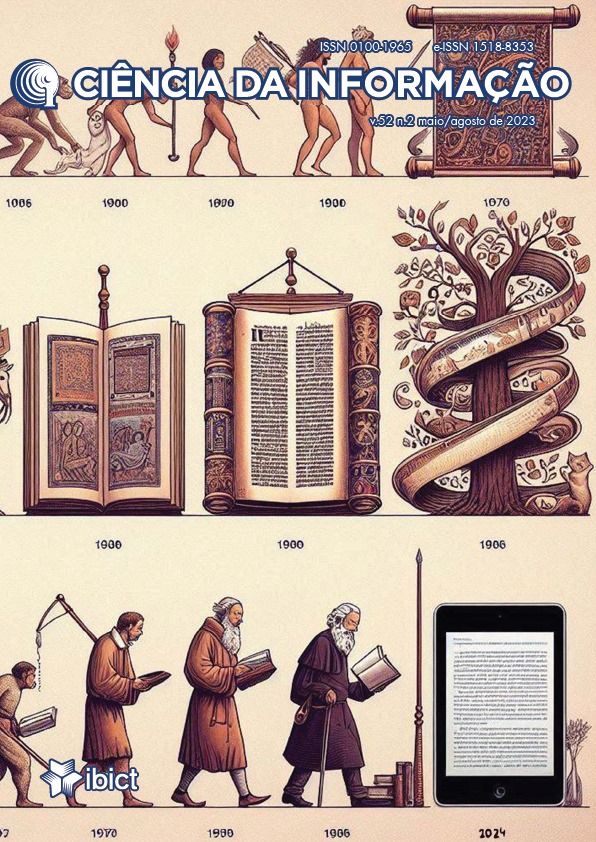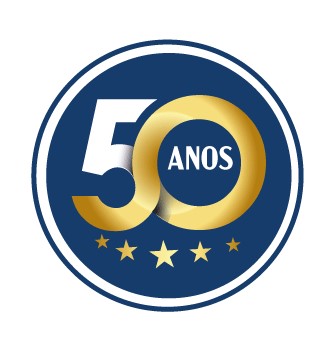The flow of information in the creation of a microlearningon circular economy
DOI:
https://doi.org/10.18225/ci.inf.v52i2.7103Palavras-chave:
information management, information architecture, informational product, microlearning, information flowResumo
Introduction: The area of education is important for a Circular Economy, as the transition to circular models requires individuals and rganizations that learn to innovate and put into practice what they have learned in the real world. This area, from elementary chool to raduate school, plays a vital role in ensuring that students of all ages are equipped with the key skills and knowledge to execute ircular thinking in their careers. Objective: Map the information flow stages present in the MOOC production process on Circular Economy. Methodology: This research is characterized as exploratory in terms of its objectives and analyzes the flow of information in the process of creating an informational product with regard to procedures. Results: This research showed that an activity of an interdisciplinary nature, such as Information Management - which evolves over time, mainly due to technological innovations - contributed to mapping the stages of needs, obtaining, treatment, distribution, use, storage and disposal of information from the information flow within the process of developing an information product – in this case, the IEC MOOC. Conclusion: Associated with the concepts of information architecture, information design and information ergonomics, GI helped in the structuring, organization and presentation of educational information, optimizing the transmission of knowledge and user experience.
Downloads
Referências
ARAÚJO FILHO, G. C. A gestão do conhecimento e a tecnologia da informação no melhoramento da performance da organização. Revista Científica Multidisciplinar Núcleo do Conhecimento, [s. l.], v. 16, n. 10, p. 34-50, out. 2020. DOI: 10.32749/nucleodoconhecimento.com.br/administracao/performance-da-organizacao.
ARAÚJO, W. C. O.; SILVA, E. L.; VARVAKIS, G. Fluxos de informação em projetos de inovação: estudo em três organizações. Perspectivas em Ciência da Informação, Belo Horizonte, v. 22, n. 1, p. 57-79, 2017. DOI: https://doi.org/10.1590/1981-5344/2601.
ARTIGAS, J. R. O uso do MOOC para o aprimoramento da escrita do Trabalho de Conclusão de Curso – TCC. Orientador: Dilmeire Sant’Anna Ramos Vosgerau. 2016. Dissertação (Mestrado em Educação) – Pontifícia Universidade Católica do Paraná, Curitiba, 2016. Available at: https://sucupira.capes.gov.br/sucupira/public/consultas/coleta/trabalhoConclusao/viewTrabalhoConclusao.jsf?popup=true&id_trabalho=4849922. Access on: 16 jan. 2022.
BATES, T. What's right and what's wrong about coursera-style MOOCs. EdTech in the Wild: critical blog posts. [S. l.], 2019. Available at: https://edtechbooks.org/wild/mooc_right_wrong. Access on: 28 jul. 2022.
BEAL, A. Segurança da informação: princípios e as melhores práticas para a proteção dos ativos de informações nas organizações. São Paulo: Atlas, 2008.
CASTELLS, M. A sociedade em rede. Tradução: Roneide Vennancio Majer. 2. ed. São Paulo: Paz e Terra, 1999.
CLARK, D. MOOCs: taxonomy of 8 types of MOOC. [S. l.: s. n.], 2013. Site. Available at: http://donaldclarkplanb.blogspot.com/search?q=MOOCs:+taxonomy. Access on: 16 jan. 2022.
COLLINS, J.; HUSSEY, R. Pesquisa em Administração: um guia prático para alunos de graduação e pós-graduação. 2. ed. Porto Alegre: Bookman, 2004.
DETLOR, B. Information management. International Journal of Information Management, [s. l.], v. 30, p. 103-108, 2010. Available at: https://www.sciencedirect.com/science/article/pii/S0268401209001510. Access on: 2 maio 2019.
DUARTE, E. N.; FEITOZA, R. A. B.; LIMA, A. R. P. Tendências inovadoras da gestão da informação e do conhecimento na produção científica da ciência da informação. P2P e Inovação, Rio de Janeiro, v. 7, n. 1, p. 166-185, 2020.
ELLEN MACARTHUR FOUNDATION (EMF). Education and learning. [S. l.], 2022. Available at: https://ellenmacarthurfoundation.org/resources/education-and-learning/circular-economy-courses. Access on: 16 jan. 2022.
GALVÃO, A. P. Da convergência tecnológica à convergência empresarial: o audiovisual como espaço de acumulação na era da digitalização. 1999. Tese (Doutorado) – Universidade Federal do Rio de Janeiro, Rio de Janeiro, 1999.
GIL, A. C. Métodos e técnicas de pesquisa social. São Paulo: Atlas, 1999.
GONÇALVES, S. C.; TAGLIAFERRO, E. R.; LIMA, L. D. S. C.; KOZUSNY-ANDREANI, D. I. Economia circular: análise e aplicabilidade nas organizações sob a perspectiva da teoria dos stakeholders. Multitemas, [s. l.], p. 21-48, 2021.
GONÇALVES, T. M.; BARROSO, A. F. D. F. A economia circular como alternativa à economia linear. In: SIMPROD, 11., 2019, Aracaju. Anais [...]. Aracaju: UFSE, 2019.
GONÇALVES, B.; GONÇALVES, V. MOOC: uma estratégia de captação de alunos?. Revista Multimédia de Investigação em Educação, [s. l.], n. 1, 2014.
HAYES, S. MOOCs and quality: a review of the recent literature. Gloucester: QAA, 2015. Available at: https://pure.aston.ac.uk/ws/files/18622357/MOOCs_and_quality_a_review_of_the_recent_literature.pdf. Access on: 24 fev. 2020.
LUDWIG, V. Transition to circular economy: the role of education from youth to higher education. European Commission. [S. l.], 2020. Available at: https://epale.ec.europa.eu/en/blog/transition-circular-economy-role-education-youth-higher-education. Access on: 16 jan. 2022.
MOLINA-MORENO, V. LEYVA-DÍAZ, J. C.; LLORENS-MONTES F. J.; CORTÉS-GARCÍA, F. J. Design of indicators of circular economy as instruments for the evaluation of sustainability and efficiency in wastewater from pig farming industry. Water, [s. l.], n. 9, 2017. Available at: https://www.mdpi.com/2073-4441/9/9/653. Access on: 25 jul. 2021.
PORTER, M. E.; MILLAR, V. E. Como a informação proporciona vantagem competitiva. In: PORTER, M. E. Competição. Rio de Janeiro: Elsevier, 2009. p. 73-96.
ROQUE, A.; COSTA, J. A. A gestão da informação no contexto da gestão escolar. Revista Linhas, Florianópolis, v. 7, n. 2, 2006. Available at: https://www.revistas.udesc.br/index.php/linhas/article/view/1332. Access on: 27 jul. 2022.
SALES, G. F. ROSA, T. O.; FARIA, T. L.; PEDRUSSI, P. C.; REINALDA, B. P. Desenvolvimento da economia circular no Brasil: a aplicabilidade na indústria e nas demais organizações. In: CONGRESSO SUL-AMERICANO DE RESÍDUOS SÓLIDOS E SUSTENTABILIDADE, 2., 2019, Foz do Iguaçu. Anais [...]. [S. l.]: IBEAS, 2019. Available at: http://www.ibeas.org.br/conresol/conresol2019/I-093.pdf. Access on: 20 abr. 2021.
SANTOS, L. R. N. Gestão da informação científica aberta: um estudo aplicado a vídeo científico em eventos. 2017. 130 f. Dissertação (Mestrado em Ciência, Gestão e Tecnologia da Informação) – Universidade Federal do Paraná, Curitiba, 2017. Available at: https://acervodigital.ufpr.br/handle/1884/47494. Access on: 24 fev. 2020.
SILVA, R.; SANTOS, L.; FREITAS, M. Reflexão teórica e conceitual sobre produto informacional e produto de informação. In: SEMANA DE ENGENHARIA DE PRODUÇÃO SULAMERICANA, 8., 2008, Bento Gonçalves. Anais [...]. [S. l.: s. n.], 2008.
VALENTIM, M. L. P. Inteligência competitiva em organizações: dado, informação e conhecimento. DataGramaZero – Revista de Ciência da Informação, [s. l.], v. 3, n. 4, 2002. Available at: http://www.brapci.inf.br/index.php/article/view/0000001053/6a50751d6d811772f23ef7de3623bcd2. Access on: 19 maio 2019.
VALENTIM, M. L. P. Gestão da informação e gestão do conhecimento
em ambientes organizacionais: conceitos e compreensões. Tendências da
Pesquisa Brasileira em Ciência da Informação, Brasília, v. 1, n. 1, p. 1-16, 2008.
VITAL, L. P., FLORIANI, V. M.; VARVAKIS, G. Gerenciamento do fluxo de informação como suporte ao processo de tomada de decisão: revisão. Informação & Informação, v. 15, n. 1, p. 85-103, 2010.
Downloads
Publicado
Edição
Seção
Licença
Copyright (c) 2024 Felipe Lopes Roberto, Maria do Carmo Duarte Freitas, Antonio Hélio Junqueira

Este trabalho está licenciado sob uma licença Creative Commons Attribution-ShareAlike 4.0 International License.
- A publicação se reserva o direito de efetuar, nos originais, alterações de ordem normativa, ortográfica e gramatical, com vistas a manter o padrão culto da língua, respeitando, porém, o estilo dos autores;
- As provas finais não serão enviadas aos autores;
- Os autores mantém os direitos totais sobre seus trabalhos publicados na revista Ciência da Informação, ficando sua reimpressão total ou parcial, depósito ou republicação sujeita à indicação de primeira publicação na revista, por meio da Licença Pública 4.0 Internacional Atribuição-CompartilharIgual
- Deve ser consignada a fonte de publicação original;
- As opiniões emitidas pelos autores dos artigos são de sua exclusiva responsabilidade;
- Cada autor receberá dois exemplares da revista, caso esteja disponível no formato impresso.





























